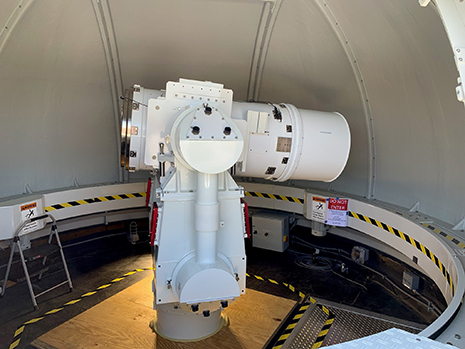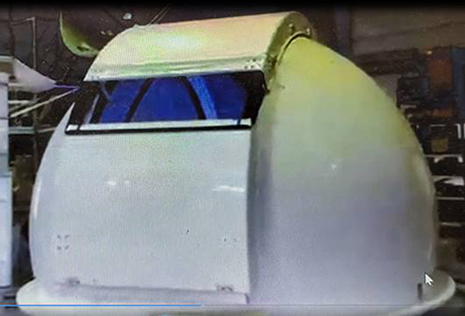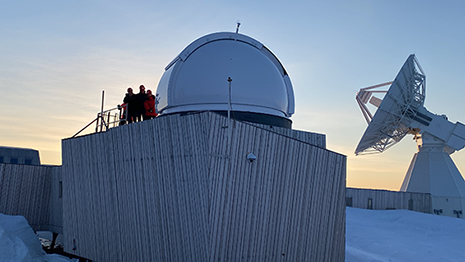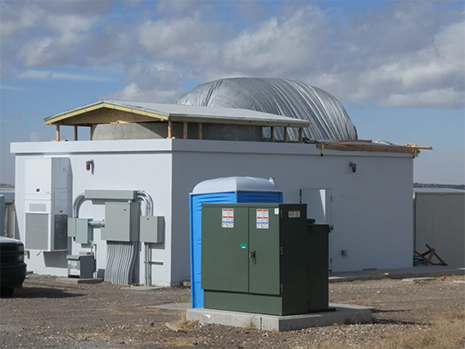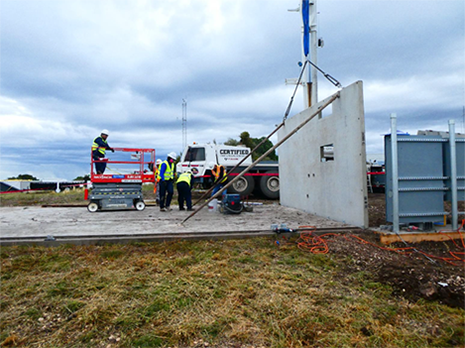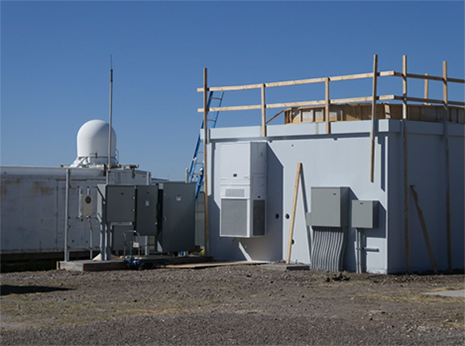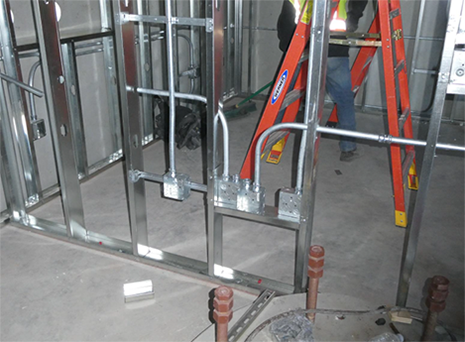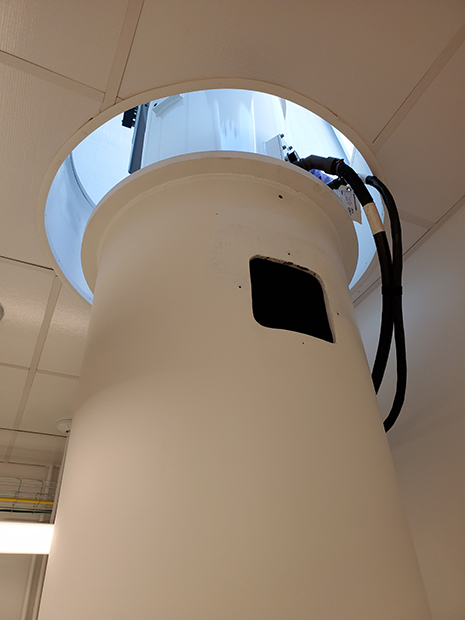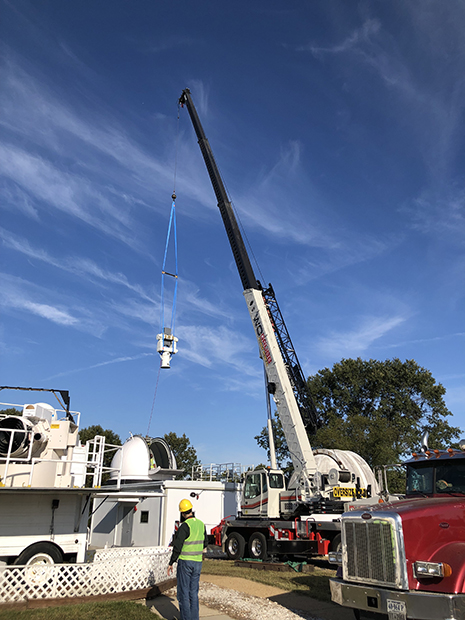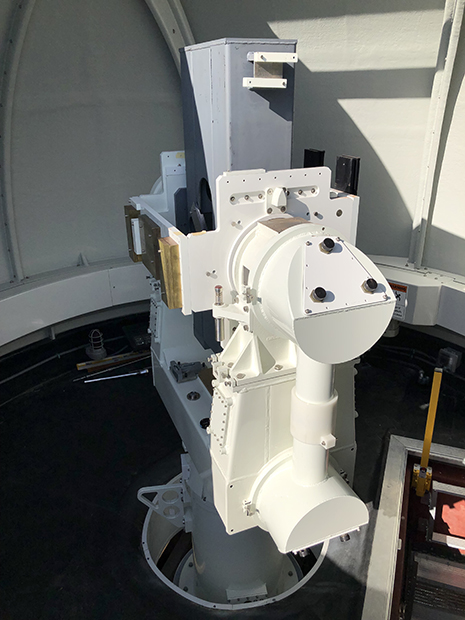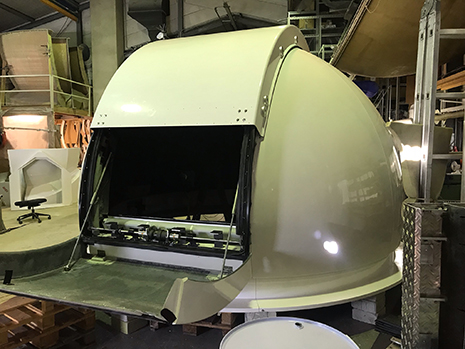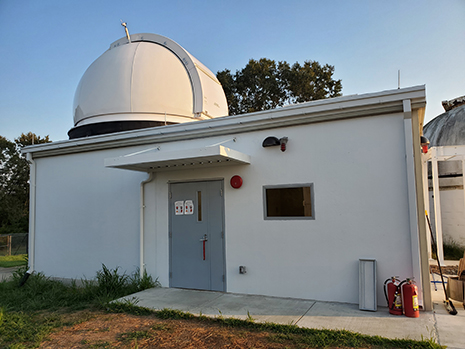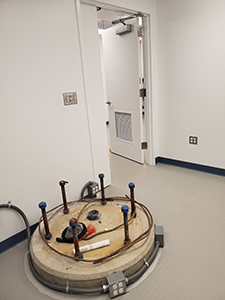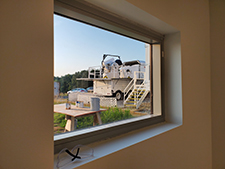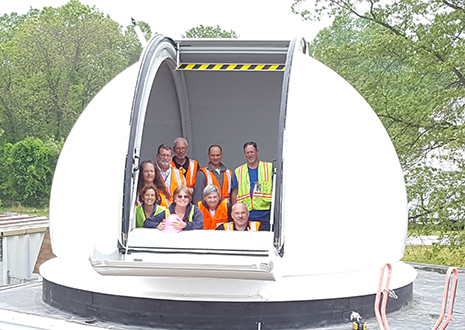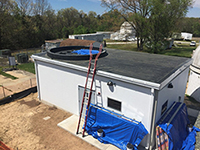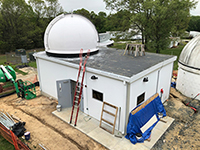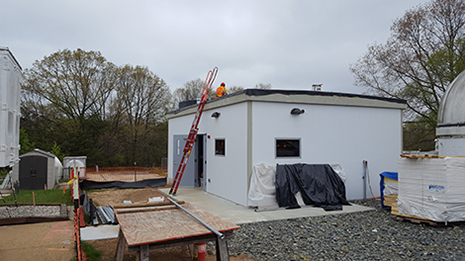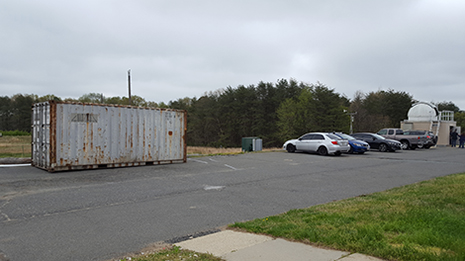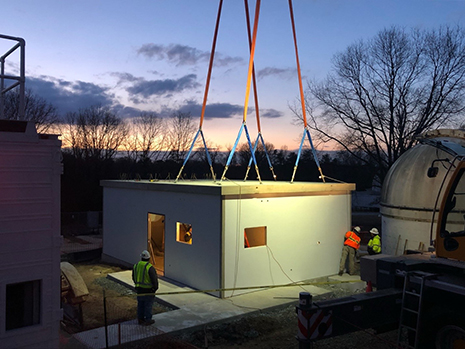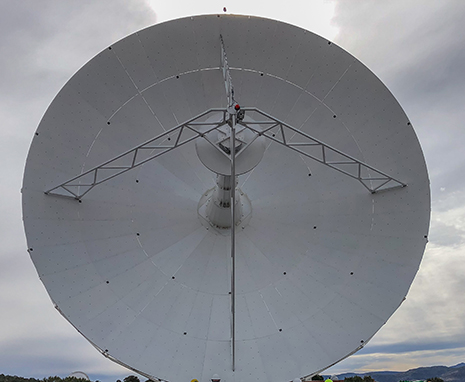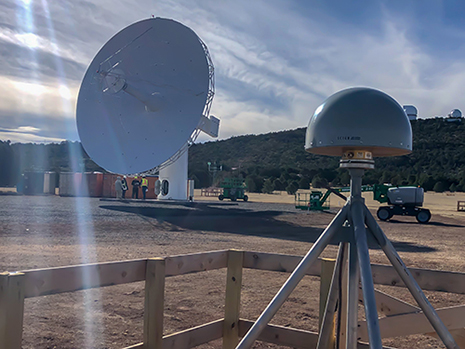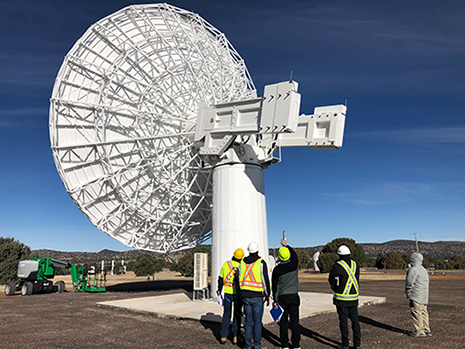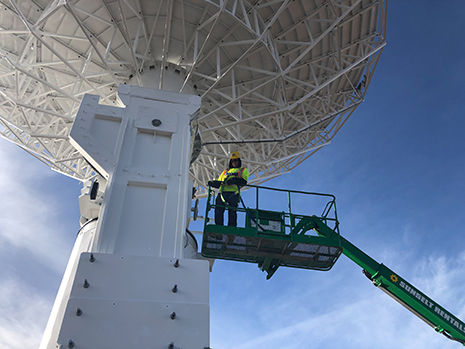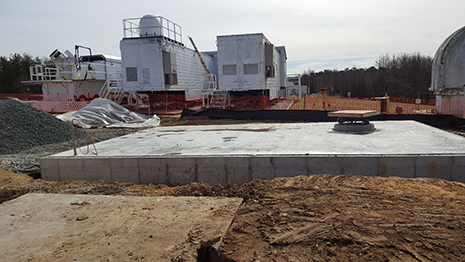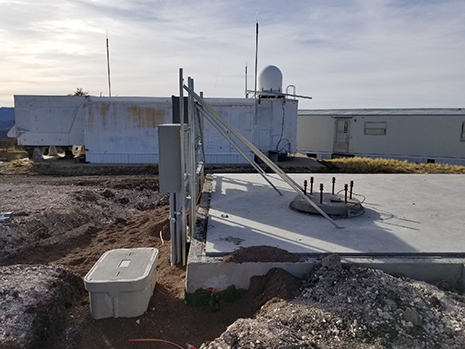Next Generation Deployment News
This page contains the Next Generation Deployment news from several sites around the network. The specific site to which a news item pertains is shown in the news item title.
Gimbal and Telescope Assembly (GTA) #1 installed in the GGAO SGSLR shelter in late June 2022
September 14, 2022
The Gimbal with Mass Simulator was removed from the GGAO SGSLR facility in June 2022 and shipped back to Cobham. After the Factory Acceptance Test at Cobham in Lansdale, the Gimbal and Telescope Assembly (GTA) #1 was shipped to GGAO and installed in the SGSLR shelter in late June 2022. Preparations for the Site Acceptance Testing (SAT) were begun shortly after installation.
Ny-Ålesund SGSLR dome hydraulic pump successfully replaced
September 14, 2022
The Ny-Ålesund SGSLR dome hydraulic pump was successfully replaced in August 2022 by Baader Planetarium as warranty work. The original pump was replaced with one that has a larger motor and does not require a heating element. Continued testing post-installation indicates that this replacement pump is working well.
Ny-Ålesund SGSLR dome passes Factory Acceptance Testing
July 2, 2020
SGSLR's third dome, built for Ny-Ålesund, Norway, successfully passed the Factory Acceptance Test (FAT) at Baader Planetarium in Mammendorf Germany on 2 July 2020. Jan McGarry (NASA) and KBR team members, including Scott Wetzel and Howard Donovan, attended the FAT virtually. KBR approved the FAT and accepted the dome. Installation of the dome at Ny-Ålesund is expected to occur in September 2020.
The Space Geodesy Project completes the installation of the dome, riser, and optical bench support structure for the new NASA Space Geodesy Satellite Laser Ranging (SGSLR) station at Ny-Ålesund, Svalbard
May 18, 2022
The Space Geodesy Project completed the installation of the dome, riser, and optical bench support structure for the new NASA Space Geodesy Satellite Laser Ranging (SGSLR) station at Ny-Ålesund, Svalbard. The installation was performed by members of the SGSLR KBR team and the dome manufacturer Baader Planetarium, along with support from the Norwegian Mapping Authority and King's Bay AS. The Norwegian Mapping Authority hosted a Geodesy Event at Ny-Ålesund for Norwegian and United Nations dignitaries to celebrate this milestone. Dr. Karen St. Germain (NASA Earth Science Division Director) gave a public lecture on "The critical role that geodesy and the global observatories play in Earth observation" at the event and Stephen Merkowitz (Space Geodesy Project Manager) served on a discussion panel. The Norwegians also produced a short video for the event: Geodesy at the top of the world.
MGO SGSLR shelter is built and ready to accept the dome
November 26, 2019
The MGO SGSLR shelter is built and getting ready to accept the dome. This picture shows the temporary roof covering the dome ring wall and protecting that part of the roof where the hole for the gimbal is located. Dome installation is expected at the end of January 2020.
MGO SGSLR shelter goes up
October 15, 2019
The MGO SGSLR shelter walls were installed on the SGSLR pad on October 15th. This picture shows the first wall panel going into place.
The dome ring wall was added after the building walls and roof were in place.
Work continues on the framing, electrical, ducting and other parts of the interior.
Gimbal and Mass Simulator installed at GGAO
September 19, 2019
Gimbal #1 and mass simulator (GMS) were crated and shipped from Cobham in Lansdale PA and delivered to GGAO early in the week of September 16th. The riser, which is needed to mate the pier with the gimbal, was also delivered to GGAO early that week.
The riser was lifted by crane into place through the dome slit in the SGSLR shelter early in the morning of the 19th and bolted to the pier.
Later that morning, once the riser installation was complete, the GMS was lifted by crane through the dome slit into place in the SGSLR dome area and attached to the top of the riser.
Power and servo controller cables were connected to the GMS. Later that same day, Cobham employees were able to move the mount under computer control through the servo controller. This was followed by NASA/KBR connecting their computer and moving the mount.
The final levelling of the mount still needs to be done, and offsets for the encoders must be determined before star calibrations can be attempted. The mass simulator has a tertiary mirror (no primary or secondary mirrors) but we expect to be able to see enough stars to do a rough initial star calibration.
This installation will allow NASA/KBR to test the performance of the gimbal and also checkout the GTA test software. Meanwhile in Lansdale, Cobham is working to complete gimbal #2 and test it. Once the first telescope is ready, gimbal #1 will be shipped back to Lansdale and mated with the telescope in preparation for the first Gimbal and Telescope Factory Acceptance Test (FAT).
MGO Dome Factory Acceptance Test (FAT) at Baader successfully completed
September 19, 2019
The MGO dome successfully passed the Factory Acceptance Test (FAT) at Baader Planetarium in Mammendorf Germany on September 19, 2019. Scott Wetzel (KBR) and Julie Horvath (KBR) were in attendance. They approved the FAT and accepted the dome. Installation of the dome at MGO is expected to occur in January 2020.
SGP officially takes ownership of the GGAO SGSLR shelter
August 08, 2019
The GGAO SGSLR shelter official inspection took place the morning of Tuesday July 30th. The official punch list for the inside was generated. Participating in this walk through were the Goddard Project Manager for the construction, Quality Assurance, Safety, the Construction team and SGP personnel (Long, McGarry, Donovan and Nelson). After the inspection, SGP officially took ownership of the shelter which is now Goddard building 228. The exterior walk through will occur after the outside stairs are complete.
Dome Site Acceptance Test (SAT) at GGAO Successful
May 06, 2019
The dome Site Acceptance Test (SAT) was performed Friday morning May 3rd and it was successful. Here is a team picture of the Baader and SGSLR teams in the dome after the successful SAT.
Dome for the SGSLR shelter at GGAO installed
May 02, 2019
The dome for the new SGSLR shelter building at GGAO was assembled by the Baader Planetarium team in the GGAO parking lot. Once the dome was built, on May 1st a crane arrived to perform the lifting. The dome ring, followed by the dome itself, were lifted and installed on the roof.
Progress on the shelter and arrival of the dome parts at GGAO
April 22, 2019
The shelter continues to progress. The doors and windows are taking shape and the roof is being worked.
The sea container with the dome parts arrived at the port of Baltimore from Germany on April 15th and was delivered to GGAO the morning of April 18th. There was a great deal of excitement at GGAO when it arrived and a lot of the site construction and SGSLR teams were there to greet it. A large forklift was required to remove it from the truck as it weighs over 5000 lbs. It is currently resting just North of NGSLR, waiting for the Baader team to arrive and assemble the parts and then install the dome on the shelter.
The SGSLR dome for the new system at GGAO passes Factory Acceptance Testing (FAT)
March 6, 2019
The SGSLR dome passed Factory Acceptance Testing (FAT) on March 5th at the Baader Planetarium factory outside of Munich Germany. The Baader development team and the three members of the SGSLR team who were at Baader’s facility for the FAT took time the following day for a group photo with the SGSLR dome. This is the dome that will be delivered to GGAO to sit on top of the shelter.
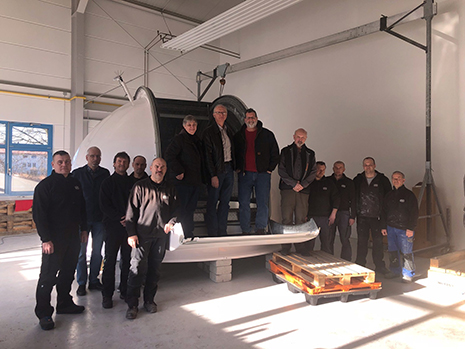
Standing on the dome flap are McGarry, Donovan and Wetzel. Just to the right of the dome is Thomas Baader.
Standing on the dome flap are McGarry, Donovan and Wetzel. Just to the right of the dome is Thomas Baader.
Watch the SGSLR dome in action below.
© Baader Planetarium, Munich, Germany
The GGAO shelter for the new SGSLR goes up in an all-day-long activity
March 5, 2019
The shelter goes up in an all-day-long activity. The sun is setting as the roof is finally lowered onto the building by crane. MOBLAS-7 can be seen in the left foreground of the picture.
The SGSLR shelter after installation. The building is together but clearly needs a lot of finishing work including adding the door and windows and the interior build out.
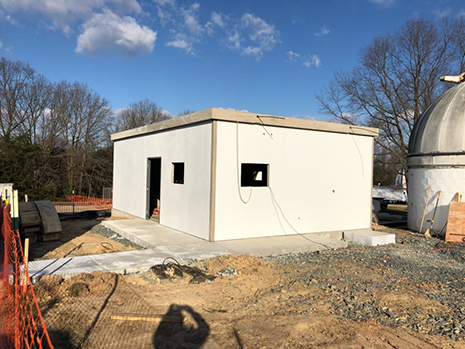
The SGSLR shelter after installation
New MGO VLBI Antenna Passes Site Acceptance Test
February 26, 2019
Intertronic Solutions Inc. completed the installation of the Space Geodesy Project’s new 12-meter VLBI antenna at the McDonald Observatory in Texas. An engineering room-temperature feed, developed and installed by MIT Haystack, was used to support the pointing tests. On February 15, 2019 several extragalactic sources were observed and the antenna successfully passed the Site Acceptance Test (SAT) on February 20, 2019. The MIT Haystack-developed cryogenic broadband signal chain will be installed in April after which the station will be ready to begin commissioning and participating in VGOS test sessions.
The concrete pad for the shelter for the new SGSLR system at GGAO has been poured
February, 2019
With the Government Shutdown now over, the pad has been poured. MOBLAS-7 is in the background with the telescope in the left most of the three trailers and the aircraft avoidance radar sits atop the center trailer.
News items
September 14, 2022
Gimbal and Telescope Assembly (GTA) #1 installed in the GGAO SGSLR shelter in late June 2022
September 14, 2022
Ny-Ålesund SGSLR dome hydraulic pump successfully replaced
July 2, 2020
Ny-Ålesund SGSLR dome passes Factory Acceptance Testing
November 26, 2019
MGO SGSLR shelter is built and ready to accept the dome
October 15, 2019
MGO SGSLR shelter goes up
September 19, 2019
Gimbal and Mass Simulator installed at GGAO
September 19, 2019
MGO Dome Factory Acceptance Test (FAT) at Baader successfully completed
August 08, 2019
SGP officially takes ownership of the GGAO SGSLR shelter
May 06, 2019
Dome Site Acceptance Test (SAT) at GGAO Successful
May 02, 2019
Installation of the dome at GGAO
April 22, 2019
Progress on the shelter and arrival of the dome parts at GGAO
March 6, 2019
The GGAO SGSLR dome passes Factory Acceptance Testing (FAT) at Baader
March 5, 2019
The shelter goes up in an all-day-long activity at GGAO
February 26, 2019
New MGO VLBI Antenna Passes Site Acceptance Test
February, 2019
The concrete pad has been poured at GGAO
January, 2019
SGSLR on Mt Fowlkes at MGO starts with pad and pier




